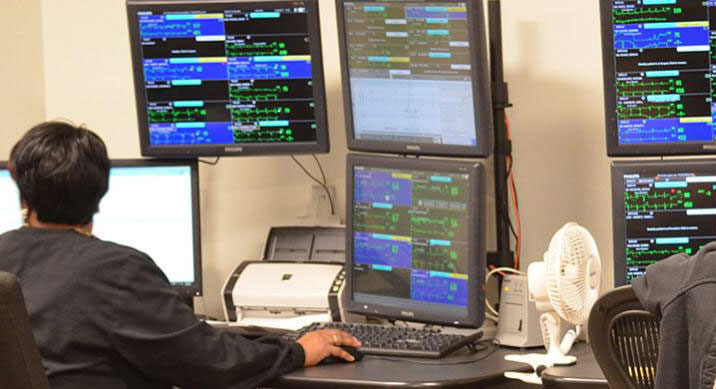Telemetry Nursing
 Telemetry nursing is a specialty where the nurse is an expert in telemetry and works closely with patients with cardiovascular complications and continuously monitors the patient’s vital signs and heart rhythm. Telemetry is performed by attaching echocardiogram sensors to a patient’s chest and reviewing the cardiac rhythm that appears in a central location. Telemetry nurses usually work in clinical facilities including hospitals and other inpatient facilities. Telemetry nurses take care of patients throughout the lifespan and with various conditions including heart failure, cardiac arrhythmias and conditions, electrolyte imbalances, and other diagnoses.
Telemetry nursing is a specialty where the nurse is an expert in telemetry and works closely with patients with cardiovascular complications and continuously monitors the patient’s vital signs and heart rhythm. Telemetry is performed by attaching echocardiogram sensors to a patient’s chest and reviewing the cardiac rhythm that appears in a central location. Telemetry nurses usually work in clinical facilities including hospitals and other inpatient facilities. Telemetry nurses take care of patients throughout the lifespan and with various conditions including heart failure, cardiac arrhythmias and conditions, electrolyte imbalances, and other diagnoses.
Telemetry nurses have the flexibility to work during the morning, evening, or even the night shift because these cardiac monitoring services are typically offered 24 hours a day and seven days a week. Telemetry nurses have a meaningful role in saving lives and preventing sudden cardiac death. Telemetry nurses save lives and identify significant risk factors every day. Telemetry nursing is a critical and rewarding specialization.
Telemetry nursing is an incredibly valuable tool for patients who have a cardiac condition and are admitted to the hospital. A telemetry nurse must have the advanced critical thinking skills to understand and recognize cardiac rhythms and be able to formulate an urgent plan quickly. A telemetry nurse is the first line of defense for a patient whose condition is declining. They must use their clinical observations, findings, and assessment skills to determine a patient’s acuity. Telemetry nurses provide their at-risk patients with constant surveillance and analysis of cardiac rhythms to detect any abnormalities or arrhythmias. This level of cardiac monitoring provides continuous analysis that promotes identification of patient health issues and promotion of cardiovascular health.
Telemetry nurses have a strong resume with many opportunities for experience., with a skill set that will translate well to other areas of nursing practice.Telemetry is a skill that will benefit nursing units like progressive care, step-down, the Intensive Care Unit (ICU), and the Coronary Care Unit (CCU). If a telemetry nurse is ever looking to join a float pool or change units, the possibilities are endless!
Education Requirements
In order to become a telemetry nurse, you must first obtain a nursing degree from an accredited nursing program to successfully become a Registered Nurse (RN). In order to become an RN, you can attend either an Associate Degree program or choose to obtain your Bachelor of Science in Nursing. After obtaining the registered nursing degree, you can sit for your NCLEX-RN to become certified. Finally, you will apply to the Board of Nursing in your state to become a Registered Nurse. Most telemetry nurses have been trained in advanced cardiac rhythms by their hospital or other accrediting bodies.
Certification
Telemetry nurses have the option to pursue several certifications that contribute to their field. You may choose to become a progressive care certified nurse by passing an exam given by the American Association of Critical Care Nurses. To sit for the exam, you must have an unencumbered nursing license, a minimum of two to five years of acute nursing experience, and have spent the requisite number of hours caring for acutely ill patients. This requirement for hours has a specification requiring a specific number of hours in the last year of your nursing career, as well.
There is also the Cardiovascular Nursing Level I Board Certified Cardiac Nurse (CVRN-BC) that is a cardiovascular competency exam that can be taken online or in-person. Typically, cardiac nurses should have at least one year of cardiac nursing experience and then apply themselves to prepare for the exam with extensive study. The program offers both an online and written study guide.
Job Description & Duties
The following are a list of basic duties that telemetry nurses should be expected to perform. The description may vary depending on the facility for which you work.
- Understand, operate, and troubleshoot cardiac telemetry devices, sensors, and echocardiograms.
- Recognize normal and abnormal cardiac rhythms, have a critical understanding of medical conditions, and apply and interpret cardiac monitoring protocols.
- Use critical thinking skills to determine patient care, complications, and acuity
- Perform a complete history and physical assessment of newly admitted clients and create a nursing care plan with suitable nursing interventions.
- Understand medication dosage, complications, contraindications, and interactions
- Administer medications, including PRN medications based on telemetry monitors, pain, or signs and symptoms of the disease.
- Provide clear patient information, thorough patient education, and recommendations for the next steps to take.
- Perform nursing skills with the expertise to provide optimal patient care and obtain clinical findings as ordered by the attending physician.
- Collaborate care with the interdisciplinary team ensuring all services ordered appropriately
- Begin the discharge education process upon admission and anticipate necessary services and referrals.
- Report any relevant laboratory findings, cardiac rhythms, abnormal vital signs, and assessment findings to the appropriate physician.
- Recognize respiratory and cardiovascular decline and know initial steps to obtain help and to stabilize your patient.
Job Outlook and Salary
The median salary for a telemetry nurse is $67,075 annually, but the range is from $47,500 to $90,000 per year. Salaries for telemetry nurses vary significantly based on acuity of the patient (ICU versus telemetry unit), experience and location. The career outlook for telemetry nursing is excellent because the need for healthcare is increasing exponentially, particularly in the field of cardiovascular medicine.
Resources
Progressive Care Certified Nurse- Adult:
https://www.aacn.org/certification/get-certified/pccn-adult
American Board of Cardiovascular Medicine: https://www.abcmcertification.com/
